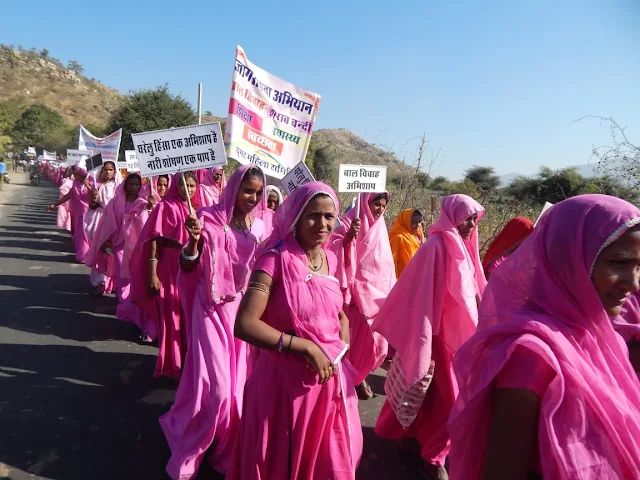Two major challenges continue to limit the full participation of rural women in development. First, their crucial roles, potential, and capabilities often remain underrecognized. Second, even when women are encouraged to take on broader responsibilities, the overarching development models may not align with their needs or perspectives and may even appear counterproductive. Under such conditions, it is unrealistic to expect women to engage as enthusiastic and creative participants.
However, when enabling environments are created that genuinely support and suit them, and when women are actively encouraged to step forward, the results are both inspiring and transformative. I have witnessed this firsthand during recent visits to several villages in Rajasthan, Uttar Pradesh, and Madhya Pradesh. In these states, I met remarkable women whose work stands as a testament to what can be achieved when trust and support are extended to them. These efforts have been catalyzed by SRIJAN, a voluntary organization that made a deliberate shift some years ago to focus more on engaging women from economically weaker backgrounds. The response has exceeded expectations, with women stepping into roles of leadership and innovation.
In Neemkhera village of Niwari district (Madhya Pradesh), I met a group of such women near a centuries-old water tank. They shared their collective journey—marked by water conservation, natural farming, multi-layer vegetable gardens, and kitchen gardens. Mobilized into self-help groups, these women have played a pivotal role in boosting incomes, lowering farming costs, improving nutrition, and enhancing ecological sustainability through better water and soil conservation.
In Jagdharpura village of Karauli district (Rajasthan), located near the vulnerable Chambal ravines, soil erosion from rainwater has long posed a serious threat. Here too, SRIJAN’s interventions—land levelling, bund construction, water conservation, and natural farming—have brought new hope. The increased focus on women's mobilization has further strengthened these efforts, as shared by the women in a group discussion.
In the Bali block of Pali district (Rajasthan), women’s self-help groups (SHGs) are particularly robust. Linked with formal banking systems, these SHGs not only facilitate credit access for small-scale enterprises but also engage in meaningful discussions on social issues. Years ago, such discussions led to a courageous anti-liquor movement that significantly curtailed alcohol abuse—a victory the women continue to defend and consolidate.
Some women are using the support of these groups to expand educational opportunities for their families. Kamli Bai, a senior member, proudly recounted how she ensured college education not just for her daughter but also for her two daughters-in-law. A younger member, Kheema, an educated woman herself, shared how she used SHG support to fund her husband's college education, which led to his employment as a schoolteacher.
In addition to such personal achievements, many of these women are also part of Ghoomar, a producer group that processes forest produce gathered by tribal communities, enabling them to earn better incomes. These initiatives exemplify how rural women are emerging as social entrepreneurs, especially in the processing of healthy, naturally grown agricultural and horticultural products.
In Pratapgarh (Rajasthan), for instance, tribal women from the Garasia community have established Dolmashree, an enterprise focused on processing guavas and other fruits from their orchards. In Tikamgarh (Madhya Pradesh), several women are now proud members and shareholders of enterprises built on natural farming. One of the most notable examples is Saroj Kushwaha from Pathari village in Tikamgarh. Saroj manages a natural farming center that produces organic fertilizers and pest repellents, not only for her own four-acre farm but also for others in her village. Her multi-layer vegetable garden has made optimal use of her small landholding while diversifying her produce.
Saroj is one among hundreds of women in Tikamgarh who have embraced natural farming with guidance from SRIJAN. Their results are promising: lower input costs, better nutrition, and improved crop diversity. Dalit farmer Guddi Ahirwar sums it up well: “Natural farming not only cuts our costs but keeps our families healthier. We hardly need to visit doctors now.” Healthier produce has also opened up new market opportunities among health-conscious consumers willing to pay a premium. But for this to work, the women had to invest in food processing capacities—carefully choosing methods that preserve the nutritional value of their products.
Kamlesh Kurmi, an early participant, explained, “We saw the benefits of small-scale local processing. When we extract mustard or groundnut oil locally, the leftover oilcake can be used as high-quality feed for dairy animals, which in turn strengthens our local rural economy.”These efforts eventually culminated in the formation of a farmer producer organization (FPO), now registered as the Ken-Betwa Women Farmer Producer Company—aptly named after the two rivers that nourish Bundelkhand. This women-led FPO has 2,300 shareholders and markets a range of products: cold-pressed mustard and groundnut oil, desi ghee made from indigenous cattle, graded groundnuts, and pulses like arhar and moong. The company also supports a sister organization by marketing kodo and kutki millets—both known for their high nutritional value.
While there is enthusiasm and optimism, the challenges are real. Market competition from large corporations can be formidable. This makes it even more critical for consumers and institutions to support such pioneering rural women-led ventures. Their success could inspire similar efforts elsewhere.
SRIJAN’s promotion of natural farming has already expanded across diverse regions, offering a rich variety of crops and fruits. The next step lies in scaling up food processing and marketing—initiatives rooted in ecological sustainability and led by rural women with vision and determination.
---
Bharat Dogra is Honorary Convener, Campaign to Save Earth Now. His recent books include Saving Earth for Children, Man Over Machine, A Day in 2071, and India’s Quest for Sustainable Farming and Healthy Food



Comments